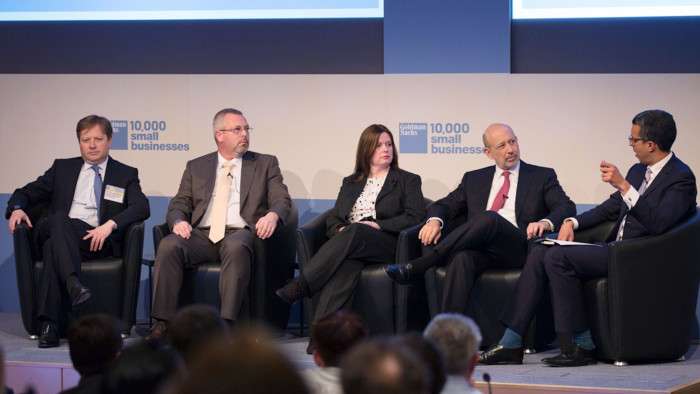Goldman Sachs and business schools help small business thrive

Roula Khalaf, Editor of the FT, selects her favourite stories in this weekly newsletter.
A programme specifically designed for the leaders of the UK’s established small businesses has helped increase revenues and boost employment in four regions - Birmingham, Leeds, London and Manchester, according to a progress report from the business schools involved in the scheme.
The programme, 10,000 Small Businesses, is funded through the Goldman Sachs Foundation and is one of several programmes designed to accelerate the growth of high-potential small businesses. Participants from the programme have reported an annual increase of 23 per cent in employees and an increase of 16 per cent in their annual turnover since completing the programme.
The original scheme was developed by Babson College in the US in 2009 and was taught through city colleges. The programme is taught in the UK by three business schools - Aston Business School, Leeds University Business School and Manchester Metropolitan University Business School. University College London is also a partner.
Mark Hart is programme director of the initiative at Aston, in Birmingham, and lead author of the progress report published in April 2013. “I’ve been really taken aback by the scale of growth we are witnessing in these companies. They are exceeding well above the national average.” While participants were chosen specifically for their potential and commitment to growth, the figures are still impressive, he explains.
For example, Anne O’Connor, co-founder and director of Fleetsolve, a liquid bio-fuelled Combined Heat and Power Systems manufacturer, has seen a 21 per cent growth in sales for her company and a 20 per cent increase in staff to 21 employees since entering the programme at Manchester in September 2012.
The company has been self-funded so far but other sources of finance are now being explored. “We are planning to go down the investment route and if we do, I think we will double in two years. The programme has made me see it is viable,” says Ms O’Connor.
Each cohort is divided at the outset into groups of five and these meet throughout the core programme to discuss real business issues and develop business growth plans. For Ms O’Connor, the participant from Halliday Funeral Supplies proved to be a strong ally. “You wouldn’t think we would have much in common… but we really bounced off each other,” she says. “There’s always something you can learn from other business owners.”
Limehouse TV, a multimedia and film production company, has also notably expanded since founder Nick Howard joined the pilot programme that ran in Yorkshire in 2010. He has hired seven additional employees and re-branded the company into three sub divisions - Limehouse TV, Limehouse Heritage and Limehouse Lab - as part of a business strategy developed on the programme. “It stripped the business model back to the core and made me rebuild it [tailoring to different audiences],” he says.
Mr Howard has also taken lessons from the social entrepreneurship models he saw other business owners using on the programme. “As a private company owner, I had never really considered the values and ethics [of social entrepreneurship], but now I can see it is important,” he says. The company now uses local suppliers, hires locally and takes on three to four pro bono projects each year.
The report is based primarily on data collected from 233 participants on the programme in the four delivery regions. Of these 233 participants, 77 per cent reported that they had increased the number of people they employed in the previous 12 months, with a further 13 per cent reporting no change.
Two thirds of the participants indicated that, compared with the same period in the previous 12 months, their turnover had increased, with a further 21 per cent reporting that it had stayed the same. The underlying profitability of the business for 53 per cent of participants meanwhile had increased, while 34 per cent reported no change.
These figures compare favourably with the wider population of small business owners in the UK, of which only 24 per cent reported in 2012 that they had more employees than 12 months previously. Similarly, only 35 per cent reported that their turnover was greater than previously.
Building on the success of the Goldman Sachs 10,000 Women initiative which provides business education to women entrepreneurs in emerging economies, the programme was brought to the UK in 2010. The main difference between the UK and US versions of the programme is that business schools have been chosen as partners in the UK rather than city colleges, as was the case in the US. “Business schools [in the UK] were already working in this space so it was a natural home for the programme,” says Prof Hart.
But unlike the commitment of the 10,000 Women initiative to reach a total of 10,000 women - a figure that will be met in 2013 - the 10,000 Small Businesses initiative is more open-ended. “Goldman Sachs will run the programme as long as there is a demand,” says Prof Hart. “We should be over 1,000 by this time next year.”
Since April 2013, almost 500 small business leaders across the UK have participated and approximately 250 new participants join the programme each year.
. . .
Comments